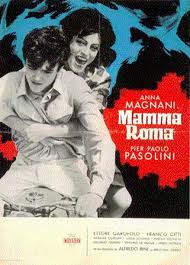Very much a transitional work for Pier Paulo Pasolini, his 1962 Mamma Roma is also about a woman (Anna Magnani) and nation in transition. Shes the veteran whore retired from her trade to be a mother to her teen son, who scarcely wants one. Around them, Rome is rebuilding from the rubble of World War II. Italian cinema is moving from neorealim to cheap, modern amorality. Much as the boisterous, earthy Mamma Roma might wish to return to simpler times, her sluggish, heavy-browed son recognizes theyre gone. She wants him to work in a restaurant, a job she secures with a bit of sexual blackmail. He just wants to hang with his homiesthe thick, sticky bond between them portending Pasolinis later, gayer workand rob hospital patients. They live in a new apartment block at the edge of Rome, and a church dome can just be glimpsed over the other rising towers. In a film suffused with religious imagery, its a shot Pasolini repeats often: There lies grace and salvation, a release from sin and earthly desire, yet who has time to pray anymore? Romes new generation of hustlers has no need for tradition or faith. (The film screens on a new 35mm print.) (NR) BRIAN MILLER
Sept. 3-9, 7 & 9 p.m., 2010




